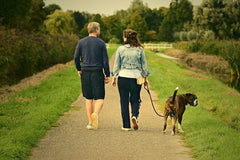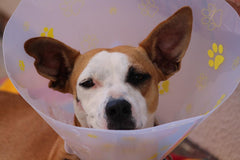
The iconic hunting dog, the bloodhound, makes a great pet whether you’re into wandering through the woods on hunting expeditions with a canine companion. Although, there are some things you should know about this breed of dog before deciding to adopt one. Their history is remarkable, for one. Their personality and care needs are also something worth reading up on and understanding before adopting a bloodhound.
Background

No historian is too certain, but experts on dog origins have found evidence that leads them to believe that bloodhounds originated around the ancient Mediterranean. After that, the hunting breed was then bred to what was considered to be perfection, in Western Europe some thousand years ago.
At this time in Western Europe, the churches and royalty were the ones to thank for the perfected breed of the bloodhound. The priests, bishops, and princes were generally the ones who were in charge of the packs of hounds that were kept and would ride out on hunts with these hounds at their side.
Due to their top-notch breeding over the centuries, since the day of their upbringing in Western Europe, bloodhound adoption is commonplace all over the world. Even in workforces such as police departments. Their impeccable sense of smell makes them an excellent ally to help them track down criminals who have tried to make a run for it.
Temperament
The bloodhound has a good temperament. This breed has a mix of personality traits, all of which make them an overall wonderful breed to share your home with. They can be calm and affectionate, while also being stubborn and determined when they become fixated on a task.
Bloodhounds, hound dog puppies especially, need lots of room to run around and get physical exercise on a regular basis. Their nature is to want to be outdoors sniffing around and exploring their environment.
If you are looking to adopt a bloodhound or even a bloodhound mix, for the purposes of having a guard dog, this breed may not be the right match for you. Their keen senses may make them sound like a good watchdog, but due to their love of making new friends with almost any person they encounter, they may not be the best guardian of your home.
Care Needs

In terms of nutrition, a bloodhound will do well on commercial, natural, or any other high-quality dog food. If you have any concerns about the food that you want to feed your dog, you can always talk to your dog’s vet. Veterinarians are a great resource when it comes to your pet’s nutrition, among many other topics of pet care.
Bloodhounds don’t require much grooming, but they can be messy. Their big floppy lips tend to make a mess when they drink or eat, so that may keep you busy at home with your bloodhound. Their big floppy ears also need to be inspected regularly for any signs of problems arising, such as infections. And finally, their eyes also need regular care, as they can get all junked up at times and would just need to be kept clean.
3 Things You Didn’t Know About Bloodhounds

One thing that you might find interesting to learn about the bloodhound is that its lineage dates back to times even before the crusades. There is evidence that tells us that there were variations of bloodhounds living in Constantinople that were being brought to Europe in this time period. These Bloodhounds were seen in black and white fur coats, unlike the brown and black bloodhounds we know today.
The Bloodhounds name doesn’t actually refer to its keen sense of smell and great tracking skills. In fact, the name “bloodhound” was created to denote their aristocratic status back in the days when they would travel alongside royalty in the forests on great hunts.
A testimony attesting to the event of a Bloodhounds man trailing during a crime can be used in court as evidence during a trial. For instance, if a crime occurred and a Bloodhound was able to track down the scent of the perpetrator, this can be used in court to convict the said criminal.
Conclusion
Bloodhounds are an ancient and royal breed of dog that represent the oldest race of hounds that would hunt using their gifted senses of smell. This breed makes a great pet, even if you aren’t going on extravagant hunts or tracking criminals through the woods. They don’t require a great deal of upkeep. Just some low maintenance grooming and hygiene needs, on top of regular amounts of love and affection.
Bloodhounds may seem like a work-oriented breed, but they do love their human and enjoy showing them affection and spending time together. Not to mention how great of a guard dog a bloodhound will make for your family home.




